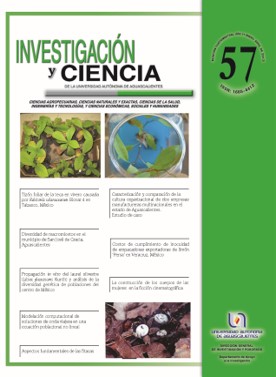Innocuousness compliance costs at “Persa” lemon packinghouses in Veracruz, México
DOI:
https://doi.org/10.33064/iycuaa2013574018Keywords:
cost analysis, recurrent cost, non-recurring cost, relating to compliance costs indexAbstract
The aim of this work was to estimate the compliance costs at “Persa” lemon packing from two regions of Veracruz to implement an innocuousness program, to define the problems they face during a Good Manufacturing Practices (GMP) certification program and the benefits they notice by fulfilling it. The information was collected by the application of a questionnaire to the packinghouses at the area of interest. Certified companies perceive food safety as an opportunity to gain markets and displace those packing that do not satisfy GMP adoption for international market. The main challenge to get the certification is low financial resources availability, so high costs for amenities. The implementation of a food safety program and its costs are considered as a non-tariff action that may affect exportations from non-certified packing.
Downloads
References
• AVENDAÑO RUIZ, B.D.; SCHWENTESIUS-RINDERMANN, R.; LUGO-MORONES, S., El impacto de la iniciativa de inocuidad alimentaria de Estados Unidos en las exportaciones de hortalizas frescas del noroeste de México. Región y Sociedad, 18(36): 7-36, 2006.
• CALVIN, L.; KRISSOFF, B., Technical barriers to trade: A case study of phytosanitary barriers and U.S.-Japanesse apple trade. Journal of Agricultural and Resource Economics, 23: 351-366, 1998.
• FAO, Sistemas de calidad e inocuidad en alimentos. Manual de capacitación sobre higiene de los alimentos sobre el sistema de Análisis de Peligros y de Puntos Críticos de Control (APPCC). Roma: Organización de las Naciones Unidas para la Alimentación, 62, 2002.
• FAO, Elaboración de un marco para las buenas prácticas agrícolas. Roma: Organización de las Naciones Unidas para la Agricultura y la Alimentación, 10, 2003.
• HENSON, S., Measuring the impact of technical measures on trade in agricultural commodities. The University of Reading, United Kingdom: Center for Food Economics Research, Department of Agricultural and Food Economics, 2000.
• HOOKER, N.; CASWELL, J.A., A framework for evaluating non-tariff barriers to trade related to sanitary and phytosanitary regulation. Journal of Agricultural Economics, 50(2): 234-246, 1999.
• KLEINWECHTER, U.; GRETHE, H., The adoption of the Eurepgap standard by mango exporters in Piura, Peru. International Association of Agricultural Economists Conference, 15, 2006.
• OYEJIDE, T.; OGUNKOLA, E.; BANKOLE, Y.S., Quantifying the trade effect of standars and regulatory barriers: is it possible? Washington D.C.: 2000.
• ROBERTS, D.; DE REMER, K., Overview of foreign technical barriers to U.S. agricultural exports. USDA, 25, 1997.
• SAGARPA, PC-012-2004-Pliego de condiciones para el uso de la Marca Oficial México Calidad Suprema en limón Persa. México: SAGARPA, BANCOMEXT, Secretaría de Economía, 17, 2004.
• SAGARPA, Ley Federal de Sanidad Vegetal. México, D.F., 22-38, 2007.
• SE, Ley para el desarrollo de la competitividad de la micro, pequeña y mediana empresa. México, D.F., 49-55, 2002.
• VAN DER VALK, O.; VAN DER ROEST, J., National benchmarking against GLOBALGAP. Case studies of good agricultural practices in Kenia, Malaysia, Mexico and Chile. La Haya: Institute of Food Safety Rikilt, 67, 2009.
• WILSON, J.; OTSUKI, T., Food safety in food security and food trade. Washington D.C.: International Food Policy Research Institute, 2003.
• ZARILLI, S.; MUSSELLI, I., Agriculture and the WTO. Washington D.C.: 2004.Dictiotopografía
• INEGI, Anuario estadístico del comercio exterior de los Estados Unidos Mexicanos 2009. De: http://www.inegi.org.mx/prod_serv/contenidos/espanol/bvinegi/productos/continuas/economicas/exterior/2009/ANUARIO_ED09/ANU_XD_1.pdf, 22 de septiembre de 2010.
• SIAP-SAGARPA, Avance de siembras y cosechas. De: http://www.siap.gob.mx/Agricola_siap/ResumenProducto.do, 26 de septiembre de 2011
Downloads
Published
How to Cite
License
Copyright (c) 2013 Jorge Aguilar Ávila, Alejandro Vaquero Vera, Gustavo Almaguer Vargas, Juan Antonio Leos Rodríguez, Belem Avendaño Ruiz

This work is licensed under a Creative Commons Attribution-NonCommercial-ShareAlike 4.0 International License.
Las obras publicadas en versión electrónica de la revista están bajo la licencia Creative Commons Atribución-NoComercial-CompartirIgual 4.0 Internacional (CC BY-NC-SA 4.0)









